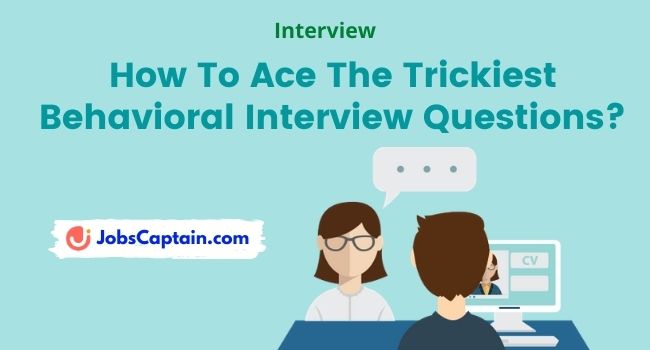
All active job seekers know the importance of adequately preparing for a job interview. These meetings, more than any other components of your search, are the events that will determine your job hunting success.
You can prepare yourself by gaining a thorough knowledge of the company, the organization’s positioning in the marketplace, their major competitors and both the long and short-term goals they hope to accomplish.
You can also research to know more about the the hiring manager and identify his or her immediate concerns.
Moreover, you can practice your responses to tricky frequently asked questions so that you feel well prepared to list your skills and accomplishments with confidence.
But how can you prepare for the difficult behavioral style questions that will likely be asked?
Such questions seem impossible to expect, as they require event-specific answers. The good news is, preparing for behavioral style questions can make the task smooth than anticipated.
Oftentimes interviewers will ask you to provide examples of times when you were disappointed with your performance: you fell short of your goals, had a conflict with a boss or coworker or failed your team. Obviously, these types of negatively focused questions can be tricky!
It is helpful to realize that the goal of the interviewer is not to embarrass you. Rather, they want to determine your self-awareness, your attitude and your ability to take direction when and as needed.
Therefore, you need to frame your responses to underscore what you have learned from the experience and how you grew from your earlier mistakes.
These types of questions will generally fall into 3 categories:
Your Interpersonal skills

Typical question: Tell me about a time when you had a conflict with a boss/colleague/customer or a client.
How best to respond: Always begin with a positive, give an example of the difficult situation (briefly so as not to dwell on the unpleasant event) and end with your key learning experience.
Example: I pride myself on my personality and my ability to get along with almost anyone. So it initially threw me when I had to work closely with a co-worker who constantly criticized my work. After trying my best to get along with this person, I realized that he was feeling threatened by me as I had been assigned some projects that had formerly been under his control. Once I figured this out, I turned to him for suggestions and advice, and his criticism soon softened. He even became an advocate for my work in various managerial meetings.
This experience taught me that, when these types of conditions arise, you can generally resolve most any conflicts by taking the time to understand the other person’s motives and needs.
Your Personal Weaknesses That Have Led To Making Professional Mistakes

Typical question: Give me an example of a time when your actions caused your team to fail to achieve their pre-set goals.
How best to respond: The weaknesses questions are particularly challenging. They open the door to exposing not only mistakes you’ve made, but character flaws as well.
This is the time to remember that brevity is best! You don’t want to give a laundry list of your shortcomings: lack of personal responsibility, overlooking important details, failure to follow through, etc. Also, make sure the example you cite is not a weakness that would have a major footprint on the position you want.
It is helpful to frame your response in the past tense, let the interviewer know you are aware of your weakness and the steps you are taking to overcome your flaw.
Remember your interviewer is looking for attitude and awareness.
Example: While still a novice in this field, I didn’t anticipate the lead-time that was necessary to market our products effectively. I had assumed that, once the products hit the stores shelves, word of mouth would be sufficient to get them bought. It didn’t take me long, however, to realize that sufficient pre-production marketing was necessary to alert the public about the benefits of buying the products. So I learned two valuable lessons:
Thorough planning, research and adequate lead-time are important and uneducated assumptions lead to mistakes.
8 Things You Should Never Bring With You To The Job Interview
How You Bounce Back From Setbacks and Failures

Typical question: Tell me about a time when you were disappointed in your performance.
How best to respond: Your response to these types of questions should be similar to how you would reply to a question about your weaknesses. You want to briefly state the condition but focus mainly on how you recovered and what you learned from the experience.
Example: When I was promoted as a new manager, I felt somewhat overwhelmed by competing obligations. In addition to my added responsibilities, the company was in the middle of launching a new product. Unfortunately, my team missed one of the deadlines we were supposed to meet. Although this wasn’t critical to the success of the product launch, I did recognize the importance of effective prioritizing in a leadership position.
I’m proud to say that, since that experience, I’ve always given my projects the planning and time they need to be successful. This has made me lead my team to operate within all required timelines since then.
Like the examples above, with sufficient forethought and planning, you can handle even the trickiest of behavioral style interview questions.
Use the job description as your guide, anticipate questions they might ask based on the required skills and experience in the posting and remember to focus on what you learned from any negative experiences you have encountered.
With sufficient preparation and a confident attitude, you are well positioned to ace the interview and land that job you really covet.
Thank you for reading “how to ace the trickiest behavioral interview questions”. If you have any query regarding trickiest behavioral interview questions, please do comment below.
